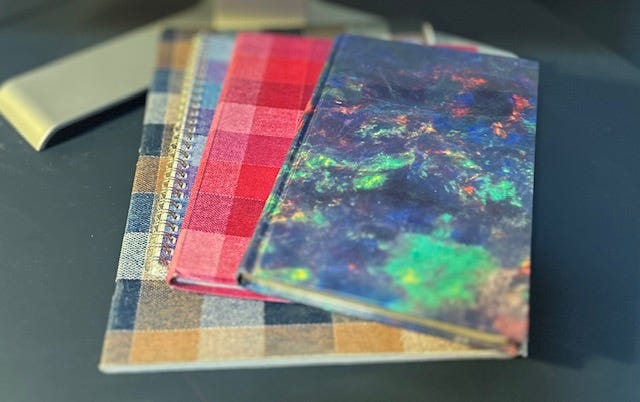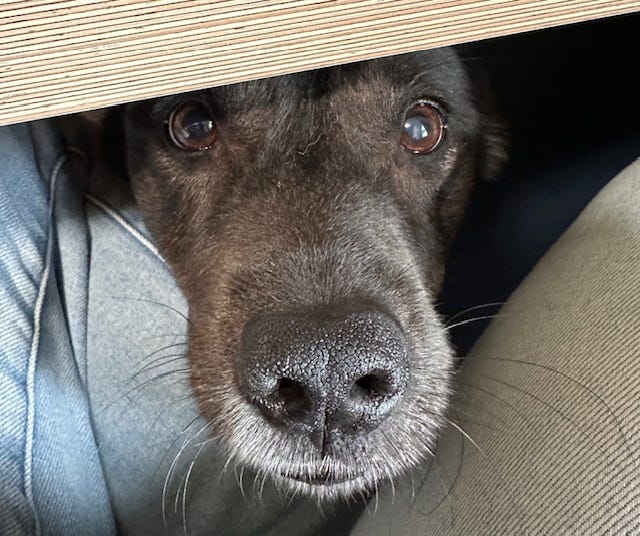To learn more about the FORGED series, visit the Table of Contents.
How to answer the difficult questions
Have you always been a writer?
At age eleven, I’d crafted a serious inquiry and mailed it to then-President Reagan telling him I wanted to be a teacher. His Secretary of Education (or some lowly assistant to an assistant) sent me a box full of “how to” information to set up a “school” in my home for the neighbor kids. Which I did.
So maybe the answer is that I’ve always wanted to be a teacher…1
When I tell people that I’ve written a book (a series, actually), the first question is, “Have you always been a writer?” The short answer: yes. I wrote essays for school. Papers, projects, book reports. You name it, I completed the assignment. I know that’s not what people are asking, but I mean, isn’t everyone a writer on some level?
Their question stumps me. Every. Time. Perhaps if they rephrased it, I could clearly answer their query.
Have you always dreamed of being an author?
No.
Not in a million years.
My fantasies were more along the lines of being a professional dancer. And yet I enjoyed writing. (Okay, maybe not book reports.) I was a prolific journal writer. I have boxes of fancy journals and 5-subject notebooks filled with my words. Emotions and thoughts and musing (and rants) that filled page after page.

But, unlike
, I don’t remember writing “novels” as a child. It wasn’t until high school and Ms. Horn’s sophomore English class that I would say I wrote anything of meaning. Anything that held meaning to me.In fact, I still have my anthology from her class.2
Since my protagonist attends the future version of the high school I attended, my high school memories are woven into bits and pieces of her story. Ms. Horn is not in the book, but some of her writing assignments inspired assignments given by Tessa’s teacher.
I even included a poem written by my 15-year-old self as a read-aloud in the Creative Writing class. Not because my late-80s self wrote a poem worthy of being in the curriculum 147 years later, but because the words resonated with my teenage self, so I figured the teenage Tessa would also connect with the words.3
So why did you write a story?
Because Tessa’s story deserves to be told.
After the death of her family in a gruesome accident, fourteen-year-old Contessa Wright is forced to leave her quiet life as a homeschooled teen in the Wilds and create a new life in an urban center of the Owyhee Zone, living with her aunt and uncle and attending public school for the first time. As she processes the loss of her family and way of life, she also unravels mysterious memories that are surfacing, making her question who she is.
I mean, what 14-year-old doesn’t question who she is? The difference with Tessa is that she told me her story. And I felt honored to have her story flow through my fingers and onto the page—er, screen.
Are there any methods to your madness?
If I had to describe what methods I use as a writer, I’d say I’m a “plantser” (thanks,
, for the term).4 I definitely start with good soil, a seed, some fertilizer, and plenty of water, but I’m not much for weeding. I let the little bits of green pop up, giving them a chance to sprout. Maybe the “volunteer” will be a stronger specimen than the seedling I started with such deliberate care, right?Tessa’s story—set 110 years from now—was planted in dystopian-dense soil. An autocratic society has sprouted from the remnants of the Pacific Northwest. Steeped in science-driven philosophies, the power struggles between the Haves and the Have-Nots are uprooting the fragile peace. The next generation is being groomed and manipulated just as a young vine is pruned and trained to grow up a trellis.
Too much gardening speak? Sorry. I was really digging the “plantser” terminology!
Shattered
In the remnants of the Pacific Northwest, 110 years in the future, fourteen-year-old Tessa Wright's idyllic life in the Wilds is disrupted by the death of her family, forcing her to move to the capital city of Bannock. Struggling with grief and adjusting to public school for the first time, she becomes haunted by fragmented memories about her past, revealing clues that suggest her family’s death was no accident.
As she grapples with these revelations, she’s drawn into a much larger conflict—one that threatens to change the course of her life and the future of her world. Amid rising tensions between the urban centers and the Wilds, the growing Underground movement threatens to expose dangerous secrets that could challenge the oppressive Ryker administration, changing everything.
As she unravels the truth, Tessa must confront her identity, decide whom to trust, and weigh the risks of fighting for justice. In a fractured and unstable society, time is running out for Tessa to reclaim her true self. In a world where nothing is as it seems, discovering the truth could cost her everything.
Do you think of yourself as a writer now?
Sort of… Storyteller might be more accurate. The point is, when I started “hearing” Tessa’s story in my head, I just had to get the words out. At night, after writing the words that had formed during the “day” hours, I’d lie awake in bed, and her story would unfold in my mind. Sometimes, new parts revealed themselves to me in my semi-conscious state. Other times, my mind processed what wasn’t working, and the path through the maze would materialize. The next session, I’d backtrack and find the sprout that I thought was a weed and nurture the “volunteer” plant to grow.5
My habit was (is) to write, write, write. Go re-fill my water. Sit back down and not remember where I was… so re-read what I had just written (from the beginning of the writing session or the beginning of the chapter) to “get back into the groove” before continuing along the path.6
Her story is (nearly) ready to share. Now, I suppose I consider myself a writer. At least a writer on Substack! Once my upcoming novel is published, maybe I’ll be comfortable calling myself an author.7
I know, semantics. But words are important. And writers (authors, in particular) have a duty to share words in ways that model possibilities. Reveal potential paths. Provide a connection for the reader—to the story, the character, the situation.
Writers (authors) don’t necessarily have the correct answer, but we can spark the conversation. Give opportunity for learning and growth. Be the inspiration for what comes next.
Good Stuff
If you want to skip what I found interesting this week on Substack, just scroll down past the divider line to reach the main topic of this newsletter.
Sure, the Velociraptors… - Thanks,
, for the great gift idea. My SIL’s birthday is coming up, and your book will be perfect! She is a librarian at a large medical university, a huge sci-fi fan, and an all-around nerdy genius with a strong, sarcastic side. And thanks for signing a copy! She will love it! (And if she doesn’t let me borrow her copy, I may just have to buy a second one for myself…)Be Lucky by
- Read this for some sage advice to “Increase your surface area for luck“ while working hard. Every interaction is an opportunity. To Learn. To Inspire. To Be Inspired.A Field Guide To The Oregon Coast's Capricious Weather -
made my dog look at me funny. Ok, fine, my laughter (caused by reading his essay on coast weather) made my dog wonder if I’d finally lost it. His writing also got me reminiscing about a road trip I took in college.
Before you go
Did you enjoy this post? Tap the heart to let me know. Restack your favorite quote. Share with your community. Recommend me to your followers. Click subscribe so you don’t miss future posts. Leave a comment.
No neighborhood kids dropped out of public school to attend my “classroom” set up in the front living room of our home. I am not now, nor have I ever been, an actual school teacher. However, I have led fitness classes since the early 90s. So, beyond my “homeschool” failure at age eleven, I am a legit “fitness teacher.” (Enough that Uncle Sam docks my income earned from teaching yoga, pilates, barre, senior cardio, and private lessons.)
You all have at least one school anthology, right? Some arts-and-craft creation of your written words or art. Please share a photo or excerpt in the comments. Or re-stack this post with your excerpt.
Anyone want to read (hear) the poem? I could tell you to buy my upcoming book once it’s published (tentatively August 2024). However, if there is enough interest, I might publish the poem here first…tell me in the comments!
Plantser: “a combo of plotting and pantsing.“ I don’t know if Olivia coined the phrase herself, but I like it!
Sorry, had to give one more gardening analogy. (If you knew how little green is on my thumb, you’d be surprised I know anything about gardening!)
Even now, with this post, I’ve forgotten that I had a thought—a plan—of what to write about, but I’m now part way through and not sure if I’ve made it to my point or simply followed a path that I didn’t even know was there! (Time to circle back…) Thanks,
, for defining “circling” as a writing process—one I embrace wholeheartedly!“Comfortable” might be a stretch. Do all authors suffer from imposter syndrome? Does it ever go away? Asking for a friend.




I don’t know if anyone else has ever used the term ‘Plantser’ before but I’ll happily take credit for it 😆
So glad I’m not the only one who writes this way! Us plantsers can form a botanical garden of authors at some point? And also there is NEVER too much garden speak in my opinion, so carry on with all things plant related, please!
Thanks for including my article, CB! Much appreciated 🙂